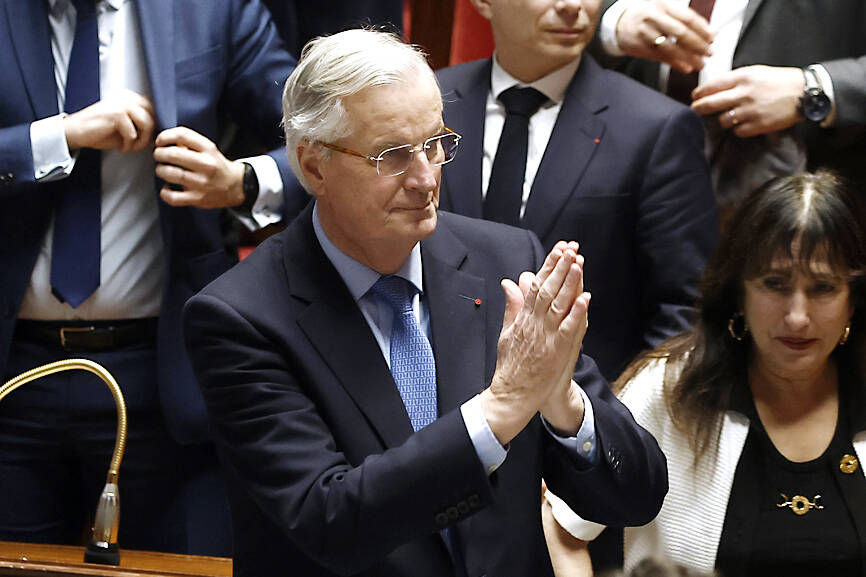French President Emmanuel Macron began looking for another prime minister yesterday after the far right joined forces with the left to push through a no-confidence motion against his government over a budget dispute.
The French president needs to find a prime minister who can pass next year’s budget through a deeply divided parliament, but any new leader would face the same financial squeeze that brought down French Prime Minister Michel Barnier’s administration.
The French president was due to address the nation after press time last night.

Photo: EPA-EFE
The budget bill that sank Barnier’s government contained 60 billion euros (US$63.3 billion) in tax increases and spending cuts that aimed for a reduction in the deficit to 5 percent of economic output next year, from an estimated 6.1 percent this year.
“This budget was toxic for the French,” National Rally leader Marine le Pen said in an interview on French television after she voted to bring down the administration.
Instead, the country needs “a budget that’s acceptable to all,” she said.
The chaos in the EU’s second-biggest economy has prompted bond investors to punish France’s sovereign debt relative to its peers and Barnier had warned of a “storm” in financial markets if he was ousted.
Bonds and the euro were unrattled by the vote, with the 10-year yield ticking lower and the common currency trading little changed. The extra yield investors demand to hold French debt rather than safer German notes declined to 81 basis points.
Barnier, a seasoned conservative and previously the EU’s chief Brexit negotiator, was only appointed in September, making his tenure the shortest for any prime minister since France’s Fifth Republic was founded in 1958. He is also the first French prime minister to lose a no-confidence vote in more than 60 years.
Macron has the authority to appoint a new prime minister, but he had a lengthy struggle before he managed to win limited support for Barnier from a fragmented parliament.
Le Pen said that she is willing to work with another government, so long as they work with her party to draw up the budget.
Macron has said he would not step down until his term ends in 2027 and he cannot be forced out of his job.

FREEDOM OF NAVIGATION: The UK would continue to reinforce ties with Taiwan ‘in a wide range of areas’ as a part of a ‘strong unofficial relationship,’ a paper said The UK plans to conduct more freedom of navigation operations in the Taiwan Strait and the South China Sea, British Secretary of State for Foreign, Commonwealth and Development Affairs David Lammy told the British House of Commons on Tuesday. British Member of Parliament Desmond Swayne said that the Royal Navy’s HMS Spey had passed through the Taiwan Strait “in pursuit of vital international freedom of navigation in the South China Sea.” Swayne asked Lammy whether he agreed that it was “proper and lawful” to do so, and if the UK would continue to carry out similar operations. Lammy replied “yes” to both questions. The

‘OF COURSE A COUNTRY’: The president outlined that Taiwan has all the necessary features of a nation, including citizens, land, government and sovereignty President William Lai (賴清德) discussed the meaning of “nation” during a speech in New Taipei City last night, emphasizing that Taiwan is a country as he condemned China’s misinterpretation of UN Resolution 2758. The speech was the first in a series of 10 that Lai is scheduled to give across Taiwan. It is the responsibility of Taiwanese citizens to stand united to defend their national sovereignty, democracy, liberty, way of life and the future of the next generation, Lai said. This is the most important legacy the people of this era could pass on to future generations, he said. Lai went on to discuss

MISSION: The Indo-Pacific region is ‘the priority theater,’ where the task of deterrence extends across the entire region, including Taiwan, the US Pacific Fleet commander said The US Navy’s “mission of deterrence” in the Indo-Pacific theater applies to Taiwan, Pacific Fleet Commander Admiral Stephen Koehler told the South China Sea Conference on Tuesday. The conference, organized by the Center for Strategic and International Studies (CSIS), is an international platform for senior officials and experts from countries with security interests in the region. “The Pacific Fleet’s mission is to deter aggression across the Western Pacific, together with our allies and partners, and to prevail in combat if necessary, Koehler said in the event’s keynote speech. “That mission of deterrence applies regionwide — including the South China Sea and Taiwan,” he

UNPRECEDENTED: In addition to the approved recall motions, cases such as Ma Wen-chun’s in Nantou are still under review, while others lack enough signatures The Central Election Commission (CEC) announced yesterday that a recall vote would take place on July 26, after it approved the first batch of recall motions targeting 24 Chinese Nationalist Party (KMT) lawmakers and Hsinchu Mayor Ann Kao (高虹安). Taiwan is in the midst of an unprecedented wave of mass recall campaigns, following a civil society push that echoed a call made by Democratic Progressive Party (DPP) caucus whip Ker Chien-ming (柯建銘) in January to initiate signature drives aimed at unseating KMT legislators. Under the Civil Servants Election and Recall Act (公職人員選舉罷免法), Taiwanese can initiate a recall of district-elected lawmakers by collecting